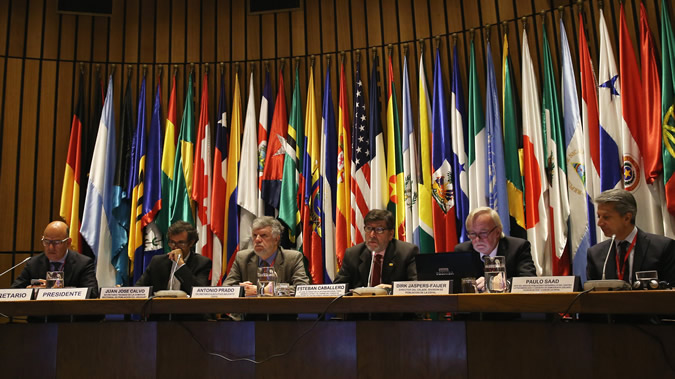Countries of the Region Analyze Guide to Implementing Measures on Population and Development
Work area(s)
From June 24 - 26, the Second Meeting of the Presiding Officers of the Regional Conference on Population and Development will be held at ECLAC’s headquarters.

Delegates from countries in the region, along with representatives of international and civil society organizations, will begin meeting today at the headquarters of the Economic Commission for Latin America and the Caribbean (ECLAC), in Santiago, Chile, to make further progress on the design of an operational guide that will facilitate the implementation, follow-up and monitoring of a set of agreed-upon measures regarding population and development.
The Second Meeting of the Presiding Officers of the Regional Conference on Population and Development in Latin America and the Caribbean was inaugurated by Juan José Calvo, the Technical Secretary of Uruguay’s Sectoral Commission on Population and President of the Presiding Officers; Esteban Caballero, Official-in-charge of the United Nations Population Fund’s Regional Office for Latin America and the Caribbean (UNFPA-LACRO); and Antonio Prado, Deputy Executive Secretary of ECLAC.
According to Juan José Calvo, the objective of this meeting, which will run through June 26, is to continue work on the drafting of the operational guide that will be presented during the Second Meeting of the Regional Conference, which is scheduled to be held in Mexico from October 6-9, and will address the implementation of and follow-up to the Montevideo Consensus on Population and Development.
This document, adopted in August 2013 by ECLAC’s Member States and associate members during the First Meeting of the Regional Conference, includes measures on the respect for human rights, aging, childhood and youth, indigenous peoples, Afro-descendant populations, migration, gender equality, sexual and reproductive health, and territorial vulnerability.
ECLAC’s Deputy Executive Secretary, Antonio Prado, emphasized that the Montevideo Consensus received broad support in Uruguay, which formed the basis of its legitimacy and strength, and has shown an innovative approach within the global process to review the International Conference on Population and Development (ICPD) Beyond 2014 Program of Action, contributing to the United Nations General Assembly’s decision to extend implementation of this plan, approved in 1994 in Cairo and originally designed for a 20-year period.
Esteban Caballero, on behalf of the UNFPA, highlighted the links between the content of the post-2015 agenda and its Sustainable Development Goals (SDGs), which will be approved in September in New York, and the Montevideo Consensus and its operational guide, which will be presented in October in Mexico in what will be the first intergovernmental meeting of the region after the SDGs have been defined.
Antonio Prado and Esteban Caballero also agreed that the Montevideo Consensus incorporates a focus on rights and inclusion as a necessary condition for achieving development in the region, which requires public policies aimed at reducing inequalities, manifested not only in terms of income but also in other areas, such as urban and educational segregation and ethnic and gender discrimination.
The Regional Conference on Population and Development in Latin America and the Caribbean is a subsidiary body of ECLAC convened on a permanent basis. Its Presiding Officers, elected in 2013, include Uruguay in the Presidency and Argentina, Bolivia, Brazil, Chile, Colombia, Costa Rica, Cuba, Ecuador, El Salvador, Guyana, Honduras, Jamaica, Mexico, Peru and the Dominican Republic in the Vice Presidencies.
Related content
Second meeting of the Presiding Officers of the Regional Conference on Population and Development in Latin America and the Caribbean
The Second meeting of the Presiding Officers of the Regional Conference on Population and Development in Latin America and the Caribbean was held at ECLAC headquarters in Santiago from 24 to 26…
Related link(s)
Country(ies)
- Latin America and the Caribbean
